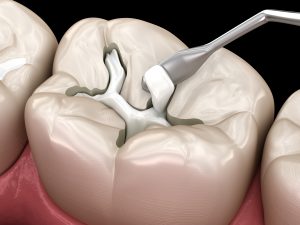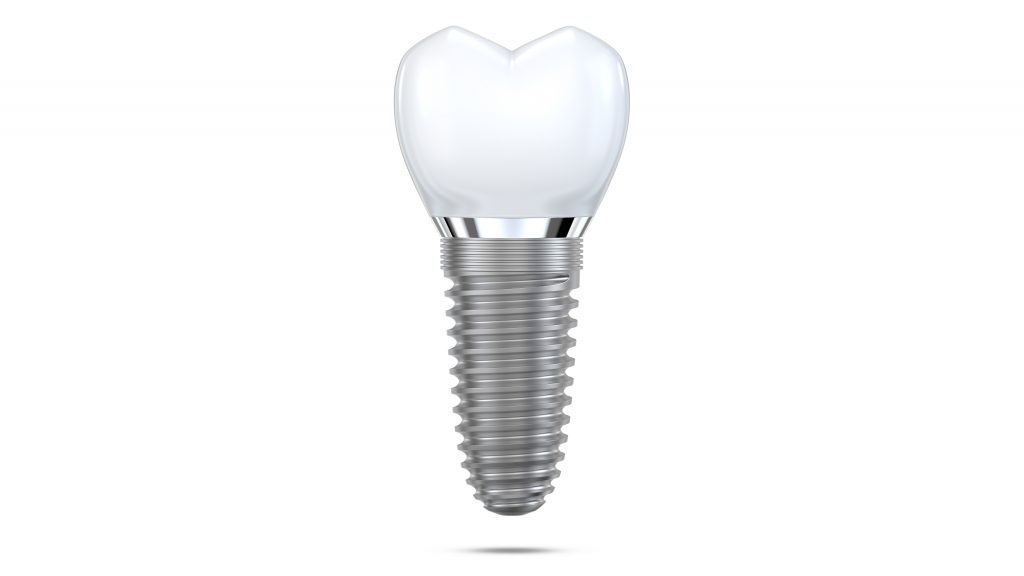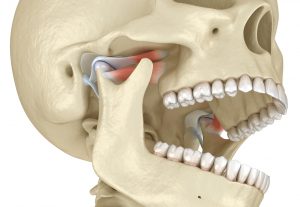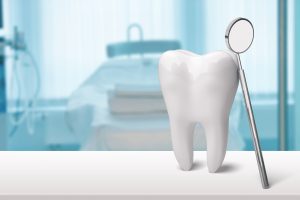 Now that 2020 is finally coming to an end, everyone is looking forward to big changes in 2021. To start the year off right, why not see our team for a checkup and cleaning? With a routine exam and cleaning, your Cedar Rapids, IA, dentist can help address concerns in the early stages and ensure you enjoy a bright and healthy smile!
Now that 2020 is finally coming to an end, everyone is looking forward to big changes in 2021. To start the year off right, why not see our team for a checkup and cleaning? With a routine exam and cleaning, your Cedar Rapids, IA, dentist can help address concerns in the early stages and ensure you enjoy a bright and healthy smile!
Could Dental Implants Improve Your Smile?
 The short answer to this question is “Yes!” If you have lost one tooth (or more) due to age, accident, injury or other causes, a dental implant could be the best answer to restore your natural smile and give you many years of comfortable eating, chewing, speaking and smiling. Implants are often the desired restoration when a tooth is extracted or lost due to other conditions. Whether it is a single tooth, or a series of teeth or a full implant denture, your Cedar Rapids, IA, dentist can offer implant solutions that truly make your smile whole again. (more…)
The short answer to this question is “Yes!” If you have lost one tooth (or more) due to age, accident, injury or other causes, a dental implant could be the best answer to restore your natural smile and give you many years of comfortable eating, chewing, speaking and smiling. Implants are often the desired restoration when a tooth is extracted or lost due to other conditions. Whether it is a single tooth, or a series of teeth or a full implant denture, your Cedar Rapids, IA, dentist can offer implant solutions that truly make your smile whole again. (more…)
What A Sensitive Tooth Might Mean
 If you’ve been noticing your teeth are more sensitive, you are in good company. Many people have teeth that give a twinge or uncomfortable reaction to hot and cold foods, cold air, very sweet or acidic foods, and more. Interestingly, the United Kingdom’s Oral Health Foundation reports that more women than men report having sensitive teeth, and it is reported frequently by those in the 20 – 40 year old age bracket, as well as those who are older. A caring dentist in Cedar Rapids, IA can help determine what your tooth sensitivity might mean. (more…)
If you’ve been noticing your teeth are more sensitive, you are in good company. Many people have teeth that give a twinge or uncomfortable reaction to hot and cold foods, cold air, very sweet or acidic foods, and more. Interestingly, the United Kingdom’s Oral Health Foundation reports that more women than men report having sensitive teeth, and it is reported frequently by those in the 20 – 40 year old age bracket, as well as those who are older. A caring dentist in Cedar Rapids, IA can help determine what your tooth sensitivity might mean. (more…)
The Importance of Lifelong Dental Care
 Your oral health is a lifelong pursuit. To keep your teeth healthy and vital throughout your lifetime, you have to take care of them. You should treat your oral health like you would your overall health. In fact, caring for your teeth and gums doesn’t require a ton of effort each day. It’s simply a matter of sticking to your daily care routine. In addition to daily cleaning, you should also attend checkups with your dentist every six months. Following these steps will give you a great chance to keep your teeth healthy and looking their best throughout your life’s journey. (more…)
Your oral health is a lifelong pursuit. To keep your teeth healthy and vital throughout your lifetime, you have to take care of them. You should treat your oral health like you would your overall health. In fact, caring for your teeth and gums doesn’t require a ton of effort each day. It’s simply a matter of sticking to your daily care routine. In addition to daily cleaning, you should also attend checkups with your dentist every six months. Following these steps will give you a great chance to keep your teeth healthy and looking their best throughout your life’s journey. (more…)
Treating Your Cavities Without Metal
 When one of more teeth develop a cavity, this doesn’t just mean an occasional toothache. Without treatment, your smile could form severe infections or even suffer from tooth loss. To prevent these complications, you may need a filling. Fortunately, your Cedar Rapids, IA, dentist will explain how we treat cavities with a metal-free restoration.
When one of more teeth develop a cavity, this doesn’t just mean an occasional toothache. Without treatment, your smile could form severe infections or even suffer from tooth loss. To prevent these complications, you may need a filling. Fortunately, your Cedar Rapids, IA, dentist will explain how we treat cavities with a metal-free restoration.
How Dental Implants Can Benefit You

Tooth loss is a topic many individuals would prefer not to talk about or consider, but the fact of the matter is that it does still occur. In fact, there are a myriad of factors contributing to structural loss, from the foods you eat to the number of dental appointments that are skipped or not attended and everything in-between. Whether decay has advanced to the point of no return or an oral structure was knocked-out, it is crucial to recognize the importance of making sure the missing structure is replaced. At Cedar Dental in Cedar Rapids, IA, our team understands the importance of ensuring your smile is complete and discusses how dental implants can benefit you.
When Your Jaw Joints Don’t Work Properly Anymore
 Many of the most common oral health concerns involve the health and integrity of your teeth and/or oral tissues (such as your gums). For example, the two most frequent oral health problems are tooth decay and gum disease, which involve oral bacteria eroding your tooth structure or gum tissues, respectively. However, when you experience pain or discomfort in your jaw, it can be more difficult to understand the problem on your own. For many people, discomfort in the jaw is an indication of TMJ disorder, which means one or both of their jaw’s joints have become unable to function properly. (more…)
Many of the most common oral health concerns involve the health and integrity of your teeth and/or oral tissues (such as your gums). For example, the two most frequent oral health problems are tooth decay and gum disease, which involve oral bacteria eroding your tooth structure or gum tissues, respectively. However, when you experience pain or discomfort in your jaw, it can be more difficult to understand the problem on your own. For many people, discomfort in the jaw is an indication of TMJ disorder, which means one or both of their jaw’s joints have become unable to function properly. (more…)
What Happens to Your Teeth when You Grind Them Too Much?
 Your healthy, natural teeth are the strongest parts of your body, but that strength can sometimes be compromised by a variety of factors. For some patients, one of these factors includes the constant grinding of their teeth, which indicates a condition known as bruxism. When you have bruxism, the grinding of your teeth is more than just an occasional occurrence, and the frequency of it can lead to a wide range of serious concerns for your teeth and oral health. (more…)
Your healthy, natural teeth are the strongest parts of your body, but that strength can sometimes be compromised by a variety of factors. For some patients, one of these factors includes the constant grinding of their teeth, which indicates a condition known as bruxism. When you have bruxism, the grinding of your teeth is more than just an occasional occurrence, and the frequency of it can lead to a wide range of serious concerns for your teeth and oral health. (more…)
How Some Children Can Benefit from Fluoride Treatment
 It’s no secret that everyone, including children, can benefit greatly from consistent preventive dental care on top of their consistent daily dental hygiene routines. However, regular dental checkups and cleanings aren’t always all that your child might need to keep their teeth strong and healthy. In some cases, children can also benefit from additional preventive measures, such as the application of fluoride treatment to the surfaces of their teeth. Fluoride is able to strengthen your child’s tooth enamel, which is their teeth’s main line of defense against harmful oral bacteria, and it may be an important step in lowering your child’s risk of developing cavities. (more…)
It’s no secret that everyone, including children, can benefit greatly from consistent preventive dental care on top of their consistent daily dental hygiene routines. However, regular dental checkups and cleanings aren’t always all that your child might need to keep their teeth strong and healthy. In some cases, children can also benefit from additional preventive measures, such as the application of fluoride treatment to the surfaces of their teeth. Fluoride is able to strengthen your child’s tooth enamel, which is their teeth’s main line of defense against harmful oral bacteria, and it may be an important step in lowering your child’s risk of developing cavities. (more…)
What Can Go Wrong If You Miss Your Routine Examination
 Staying up-to-date with your routine check-ups and examinations is an important half of the standard oral health regimen, followed by daily brushing and flossing. While you may believe that you are on top of your smile’s health, skipping your examination and cleaning puts it at a disadvantage for multiple reasons and can result in threats from oral bacteria, disease, and even tooth loss. At Cedar Dental in Cedar Rapids, Iowa, we emphasize the importance of having a professional tend to your smile to keep it healthy and welcome you to our office for a regular cleaning and check-up.
Staying up-to-date with your routine check-ups and examinations is an important half of the standard oral health regimen, followed by daily brushing and flossing. While you may believe that you are on top of your smile’s health, skipping your examination and cleaning puts it at a disadvantage for multiple reasons and can result in threats from oral bacteria, disease, and even tooth loss. At Cedar Dental in Cedar Rapids, Iowa, we emphasize the importance of having a professional tend to your smile to keep it healthy and welcome you to our office for a regular cleaning and check-up.




Recent Comments